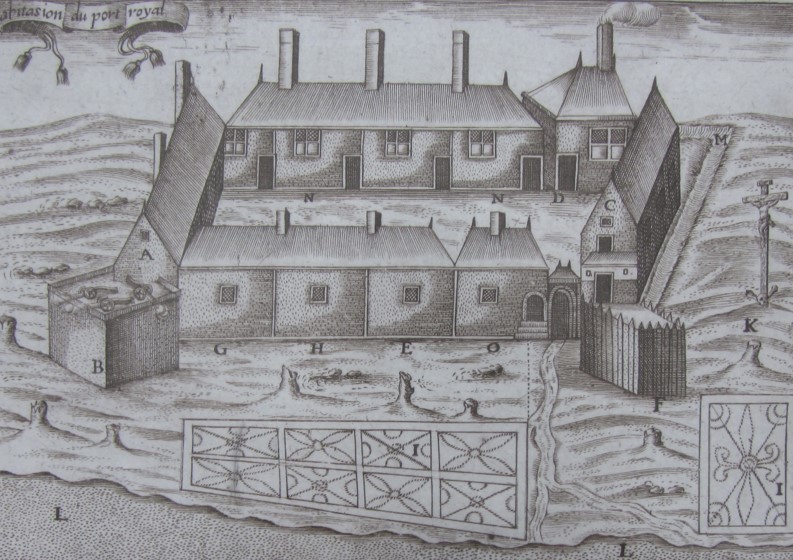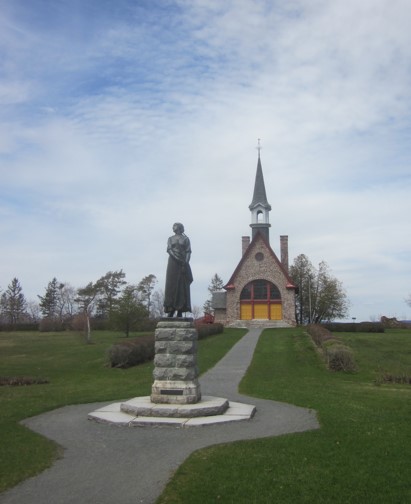This three-part series was first presented as “British Acadia Between Imperial Imagination and Colonial Reality” for the Acadian Archives’ annual lecture series in 2022. Please cite appropriately. Recordings of past lectures are available through the Archives.
“British Acadia”: The expression may, at first glance, seem like a contradiction in terms. We easily think of Acadia as a distinctly French society. We should recall, however, that Acadians lived under English or British rule for half of the period between the large-scale arrival of French settlers and the Deportation. Port Royal, the French power center on the Bay of Fundy, in present-day Nova Scotia, fell to the British in 1710. By 1755, year of the infamous and tragic Deportation order, a majority of Acadians would have had no recollection of life under French rule.
The purpose of my talk is to address two paradoxes. First, what we imagine as the golden age of Acadia actually unfolded while this population lived under the British regime, the same regime that would deport the near-entirety of French-heritage colonists. How could a cultural cohabitation that had lasted forty years unravel so suddenly and tragically in the 1750s? Second, we often read that the Deportation was a “land grab” meant to make room for New England colonists. But why would this happen specifically in the 1750s, and neither sooner nor later? Both of these questions relate to power and to intention. We can begin to provide answers by reestablishing the sequence of events and the changing concerns of British authorities in London, in Nova Scotia, and in other colonies. Surviving correspondence between these individuals offers an unmatched glimpse into their concerns. The documentary record lays out their ambitions and what they deemed to be within their power to achieve.
A disclaimer is in order here. As we review the evidence, please remember that I am a historian. My purpose is to explain, not to justify. In other words, I wish to look at these events causally, not morally. I believe we can explore with caution and with nuance the decisions and events leading to the Deportation without minimizing the tragedy or the failure of humanitarian sentiment as Acadians were ripped from their ancestral homes.

As we set the stage for this plunge into the origins of the Deportation, four specific aspects of the colonial experience should retain our attention.
- The Acadians lived in proximity to the Mi’kmaq people. Like other Indigenous nations in the early colonial period, the Mi’kmaq endured epidemics, the loss of their ancestral territory, population losses through war, and the constant turmoil of imperial rivalries. We must recognize the trauma that the original occupants of the land experienced over the course of centuries. Though the rapport between Acadians and the Mi’kmaq was generally more peaceful than Native-settler relations elsewhere in North America, we should not assume that the two groups had the same interests, far from it.
- In the late seventeenth century, Acadia was located on the outer edge of New France— practically on New England’s doorstep. Considering how many times the region changed hands in that century, we should not assume that it had a distinctly French destiny from which the colonists were ripped in 1710. It was in the nature of Europe’s great powers to seek to extend their influence and their means through war. From the 1680s to 1763, a period of less than eighty years, France and England went to war with one another four times; in North America, those conflicts lasted a combined thirty years. In this sense, the conquest of 1710, through which the British gained control of the Acadian or Nova Scotian mainland, is not an aberration. It is, however, unique in that it was one of the largest cessions of territory until the 1760s and that Britain suddenly inherited a Catholic population numbering in the thousands.
- Even by modern standards, this was a violent world. Proportionally, wars often had a much higher human toll. In times of declared war, colonists on the New England frontier lived in dread of raids by combined French and Native forces like the attack unleashed on the unsuspecting families of Oyster River, New Hampshire, in July 1694. In no time, over one hundred people were killed; 27 were taken back to present-day New Brunswick as captives. A decade later, a similar raid on Deerfield, Massachusetts, left over fifty dead while 112 grieving souls were marched back to New France in the middle of winter. When civilians were spared raids and battles, they often still contended with the seizure of their crops or the destruction of their property, with tragic long-term consequences ensuing.
- Acadian society was not static from the 1680s to the Deportation. French-heritage colonists all along the Bay of Fundy continued to maintain ties, under British rule, with the neighboring French colonies. However, the colonists’ “Frenchness” evolved due to changing political and economic conditions. With one generation giving way to another, they truly became a New World people with no personal relationship to metropolitan France. After 1710, the number of priests dwindled and formal education declined. Acadians engaged in trade with the colonists of Maine and Massachusetts. Cultural exchange with the small English population occurred in the Annapolis Royal area. Over time, Acadians experienced ethnogenesis, the development of a new and unique society with its own identity.

To summarize, in the 1710s and beyond, the Acadians—like the French Canadians in the St. Lawrence River valley—increasingly formed a distinct, identifiable society. They could not escape the competing interests of their Mi’kmaq neighbors, their British rulers, and their former overlords, the French officials, merchants, and military forces now concentrated on Cape Breton. At last, Acadians’ future was precarious by virtue of their geographic location and the likelihood that they would again see violent conflict unleashed in and around their communities. In all of this, we have elements that help us understand the Deportation. We should no less explore why a turnaround in British policy occurred in the 1750s when the Deportation was far from a foregone conclusion.
Let us return to the document that placed Acadians under British rule, the Treaty of Utrecht of 1713, one of the agreements ending the lengthy War of Spanish Succession. While Indigenous peoples were at liberty to trade and move across the peninsula, Article XIV of the treaty “provided, that in all the said places and colonies to be yielded and restored by the most Christian King [Louis XIV], in pursuance of this treaty, the subjects of the said King [the Acadians] may have liberty to remove themselves, within a year, to any other place, as they shall think fit, together with all their moveable effects. But those who are willing to remain there, and to be subject to the kingdom of Great Britain, are to enjoy the free exercise of their religion, according to the usage of the church of Rome, as far as the laws of Great Britain do allow the same.” On the surface, these were fairly generous terms. The Acadians did not have to remain under British rule; they could relocate to Cape Breton or to Ile Saint-Jean, today’s Prince Edward Island, which were still French-ruled. Those who remained could still practice their faith, although “the laws of Great Britain” would prevent them from serving in a position of public trust. Finally, it was implied that those remaining would accept British suzerainty and become British subjects in the full legal sense of the term.
If self-deportation might have seemed more attractive than the prospect of life under British rule, we should remember that Acadians had improved their lands over the course of decades. They had cattle, houses, and barns; they had reclaimed land from the sea by building dykes that are still visible today. They had formed communities. In the wake of the treaty, all signs point to genuine ambivalence. In November 1714, over a year and a half after the signing of the treaty, Colonel Samuel Vetch, the commander at Annapolis Royal, explained to the Board of Trade in London that nearly all Acadian families had committed to relocating to French colonies. Few had yet done so, however, and the colonial authorities seemed reluctant to force the issue. Vetch traced the likely consequences of this mass departure. It would leave
that country intirely destitute of inhabitants: There being none but French, and Indians (excepting the Garrison) settled in those parts; and as they have intermarried, with the Indians, by which and their being of one Religion, they have a mighty influence upon them. So it is not to be doubted, but they will carry along with them to Cape Bretton both the Indians and their trade, Which is very considerable. And as the accession of such a number of Inhabitants to Cape Bretton, will make it at once a very populous Colony . . . one hundred of the French, who were born upon that continent, and are perfectly known in the woods; can march upon snow shoes; and understand the use of Birch Canoes are of more value and service than five times their number of raw men, newly come from Europe. So their skill in the Fishery, as well as the cultivating of the soil, must inevitably make that Island, by such an accession of people, and French, at once the most powerful colony, the French have in America. And of the greatest danger and damage to all the British Colony’s . . .
Vetch added that the French would take their cattle, sheep, and hogs with them, movable wealth that could otherwise serve the imperial economy and support the local British garrison. This was also the tenor of remarks sent to London by Nova Scotia’s lieutenant governor almost a year later. Beyond the economic losses, he stated, “in case [the] french quit us we shall never be able to maintaine or protect our English family’s from [the] insults of [the] Indians, [the] worst of enemies, w[hi]ch [the] french by their staying will in a great measure ward off, for their own sakes.” This is to say that from the perspective of local authorities, despite the challenge of ruling a “foreign” population whose allegiances were still doubtful, the Acadians could be an asset if they stayed put.

Migration is always a high-risk endeavor. So long as they could do so safely, Acadians in Nova Scotia preferred to stay on the lands they had occupied for several generations. Unable to find purchasers for their lands, facing a weak British colonial government, and unsure of their likely prospects on Cape Breton, these Acadians as a whole stayed put. The issue of safety also played into their decision, at least if we take their own statements at face value. The Mi’kmaq had shared geographical space with Acadians; a small number of mixed marriages had occurred. Yet, at the same time, the Mi’kmaq were dependent on the French crown for trade opportunities and access to firearms. They had fought alongside French soldiers and they had forged an alliance with the king and his representatives rather than with a specific people. This relationship survived the treaty of 1713 and the Acadians were caught in the crossfire. At times, they faced the intimidation of Native groups that expected them to remain loyal to France in every respect. When, in 1720, the British began to demand an oath of loyalty from their Acadian subjects, the latter protested that in obeying the order, “we should exposed both ourselves and our families to the fury of the savages.”
The French on Cape Breton were not any fonder of Acadian neutrality than the British. They did not want to lose these old subjects to the rival empire. The British believed that Catholic priests who remained in Nova Scotia were agents of France, both manipulating the Natives and persuading the Acadians that they would face the oppression that Irish Catholics had experienced through the seventeenth century. Paradoxically, the fear of Native reprisals that ran rampant in Acadian communities also deterred a concerted effort to settle more British subjects—from Britain or the Thirteen Colonies—in Nova Scotia. Security would remain the primary concern of colonial leaders until the end of the Seven Years’ War.
This series will continue next week.
Pingback: Friday’s Family History Finds | Empty Branches on the Family Tree
Pingback: This week's crème de la crème - May 20, 2023 - Genealogy à la carteGenealogy à la carte